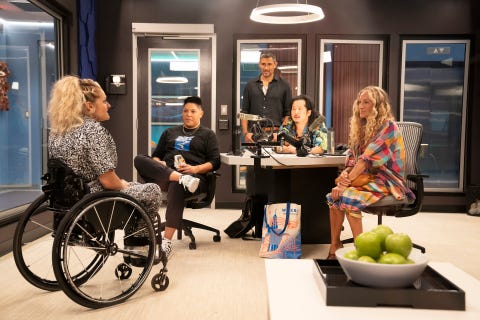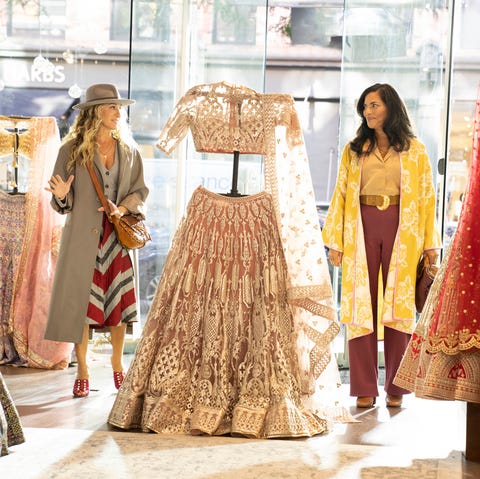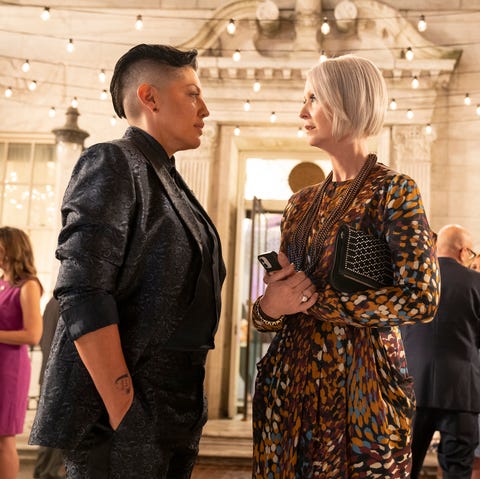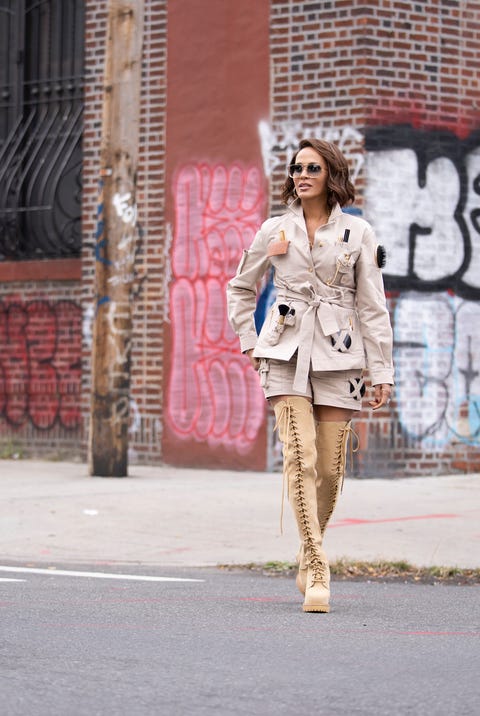When HBO announced a Sex and the City revival, I was on the fence. Despite the network’s multiple attempts at recreating the iconic ’90s show in various forms (I’m looking at you, Girls), there had yet to be a rom-com series that lived up to the original. And that’s partly because SATC is one-of-a-kind.
Adapted from Candace Bushnell’s 1997 book of the same name, SATC introduced something relatively unseen in mainstream media: a group of unmarried women in their mid-30s who had sex—and lots of it. Though the idea of SATC doesn’t seem that groundbreaking by today’s standards, in 1998, it was a provocative premise. Still, the series aired for six seasons and got two movie adaptations. It doesn’t matter it has lived far past its prime; it remains one of those iconic shows, with an avid fan base rivaled only by The Sopranos (which aired around the same time during HBO’s heyday).
So, despite my concerns, I (along with thousands of others) tuned in every Thursday to see what our favorite, now middle-aged white women were doing in 2021.
Did I expect And Just Like That… to be as good as the original? Of course not, especially with Samantha Jones missing in action (she’s sort of replaced by realtor Seema Patel, but we’ll get to that later). But the revival was more than a disastrous train wreck. It was “wokeness” and “diversity” messily packaged into three rich white women’s lives.
The SATC reboot desperately needed diverse characters and inclusive storylines. New and old fans alike agreed that there were plenty of problematic moments in the show, from Carrie’s refusal to date a bisexual man because she believes bisexuality “doesn’t exist” to the blatant sexualization of Black men. (That one time when Samantha dated Chivon, a Black music executive and made sexual comments about his penis, labeling it a “big Black cock,” still irks me to this day.) And don’t get me started on Dr. Robert Leeds.
So, I understand that AJLT wanted to right the wrongs by making Carrie, Miranda, and Charlotte progressive and liberal, even though they’re all wealthy, cis, white women. Making Miranda leave her white-shoe law firm to get a degree in human rights or making prudish Carrie on a sex-positive podcast didn’t feel realistic. But the show’s attempts at “inclusion” weren’t just far from groundbreaking; worse, they repackaged some of the show’s past problematic moments into modern-day microaggressions.
The fact is, there’s nothing woke about AJLT. Although it’s great to see people of color and other non cis, white, disabled characters, these new characters would’ve gone further if they weren’t one-dimensional. Take Miranda’s Black professor, Nya Wallace, for example. Even though her storyline includes important conversations about fertility struggles, the character still somehow feels pushed to the side. We don’t know much about her degree, her husband, and her life outside not wanting to start a family. She simply serves to be Miranda’s anti-racist co-signer, even though Miranda made racist comments during their first meeting.
Take, as another example, Charlotte’s mom friend, Lisa Todd Wexley, aka LTW (also dubbed the “Black Charlotte” by Anthony). What’s off-putting about their relationship is Charlotte’s painfully overt attempts to impress her, even go as far to googling Black culture in an effort to “wow” Lisa. Charlotte even pressured her Black neighbor to attend her dinner party just so Lisa and her husband wouldn’t be the only Black guests in attendance. Maybe Charlotte’s intentions were good, and she wanted to make Lisa feel more comfortable. But this need to become friends doesn’t feel genuine. People-pleasing may be a classic Charlotte trait, but that’s not an excuse for her to treat the Black women around her this way. If Lisa were anyone else but a distinguished name in the New York social scene, would Charlotte still go to these lengths? I think we know the answer.
We also can’t talk about diverse characters without talking about Samantha’s pseudo-replacement, Seema. The similarities between Samantha and Seema are so identical: unmarried? Check. Unfiltered about her dating life? Check. Confident and self-assured enough to give Carrie a run for her money? Check. And while it’s exciting to see a South Asian woman in a role like this, Seema’s storyline has its own issues, especially in the Diwali episode. The arranged marriage plot, while a custom still practiced today, felt stereotypical, and the writers failed to double-check before calling a lehenga a sari. Seema, like Lisa and Nya, falls into the POC best friend trope, only serving to propel their white friends’ storylines forward.
Perhaps the most jarring aspect of the reboot is Che Diaz. Unlike other fans, I’m not so up-in-arms by Miranda and Che’s love affair (Steve does deserves better, though). I was excited to see Che and their introduction as an unapologetically non-binary person of color who loves sex and doesn’t subscribe to traditional rules of dating (the kind of representation we desperately needed in the original series). And yet, Che’s main purpose is to trigger Miranda’s sexual evolution. Though we see more of Che than other POC characters, their interactions with the cast (aside from our grey-haired girl boss) are rare. They simply come around to help Miranda’s disastrous love life, become her new partner, and, most likely, vanish by the season finale. What a fairytale ending.
With the exception of Che, the newcomers on AJLT are kept in their own lanes. They don’t interact with each other; they’re each main character’s respective “diversity girlfriend.” They may each be dealing with their own issues—Seema is navigating unmarried life in her 50s, LTW argues with her husband—but none of their decisions or actions drive the plot. They exist in their own scenes and then we move on.
I never expected for And Just Like That… to be this anti-racist and anti-oppression show. It is a series about rich middle-aged white women, after all. But this repackaged brand of political correctness is nothing but a 2021 version of “I don’t see color.” And, honestly, it’s traumatic to viewers of color. These problematic moments are not just things we can cringe through and nervously laugh off (though many of us do); they have a harmful message too.
When viewers of color ask for inclusivity, we want genuine and honest representation—not side characters who are subject to microaggressions for laughs and lack the same dimension as their white peers, whose storylines aren’t solely driven by their identity. We’re still living in a time where marginalized people are waiting to see more well-rounded representation in mainstream Hollywood beyond trauma porn, token casting, and supporting roles. AJLT doesn’t do anything to change that. It’s not a win for diversity when the show casts four new “leads” of color who only prop up the white main characters. As Black women, whose communities’ stories have been suppressed for generations, seeing the show use this stereotype informs me (and plenty of others) that nothing has changed in the 24 years since Sex and the City first premiered.
I don’t expect for the characters on And Just Like That… to have a perfect understanding of gender and race. And let’s face it, the show would’ve faced criticism whether it included women of color or not. But the execution of the leading trio trying to be more aware and socially conscious, well, it’s just bullshit. I’d rather see Miranda take Diversity, Equity, and Inclusion classes at her corporate law firm; Charlotte befriend only white moms rather than be propped up by the Black mom friends around her; and Carrie be as oblivious and self-centered as she was in the original. At least then I would recognize the three women on the screen in front of me, and see the show’s limitations for what they are.
SATC was groundbreaking for a reason. A show that boldly featured 30-something financially independent women seeking love on their own terms will always be one of its kind. I like seeing Miranda, Charlotte, and Carrie again, but sometimes, our old favorites are incompatible with the world as it exists today—and best left in the past.
This content is created and maintained by a third party, and imported onto this page to help users provide their email addresses. You may be able to find more information about this and similar content at piano.io




